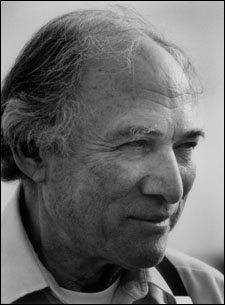Sheldon White, architect of youth policy, dies at 76
Longtime Harvard psychologist was noted for studies of cognitive development in children
Sheldon H. “Shep” White, a developmental psychologist who was instrumental in the formulation of children’s policy and programs in the United States, died unexpectedly at a Boston hospital on March 17.

White, 76, the John Lindsley Professor of Psychology Emeritus at Harvard University, had been a Harvard faculty member for four decades. The cause of death was heart failure, his family said.
Widely respected for his creative studies of learning and cognitive development in young children, White gained national prominence starting in the 1960s as a contributor to major initiatives for children including Head Start, “Sesame Street,” Follow Through, and programs associated with the 1965 Elementary and Secondary Education Act. In the early 1990s, he chaired a Head Start Research and Advisory Panel for the U.S. Department of Health and Human Services.
“We are greatly saddened to learn of Professor White’s passing,” said William C. Kirby, Edith and Benjamin Geisinger Professor of History and dean of the Faculty of Arts and Sciences. “His work in children’s learning itself helped the field of developmental psychology to grow. His role in shaping the highest-quality, most efficacious programs for children’s education affected the lives of countless young people. Harvard’s students, and faculty, have benefited from Professor White’s presence in his field, and on our campus.”
An acknowledged expert in the fields of child development and education, White’s conviction that research findings should make their way from the laboratory to the classroom led him to integrate scientific and professional values into educational practice. He moved effortlessly from the laboratory to the classroom to the committee chambers of Washington.
White’s many publications included works on the history of ideas and practices in child development, analyses of the ethical issues that arise in the course of educational practice, and studies of educational policy. Over the course of his career his interests evolved from the process of learning to a concern for the many other factors, such as social and emotional influences, that may help or hinder learning in the real world.
A talented violinist and painter, White was an admired teacher, according to colleagues.
“The model that he provided was as a thoughtful scientist who cared about the social consequences of the real-world application of his findings, not only in terms of their effectiveness but also their consonance with basic ethical principles,” said longtime colleague Brendan Maher, the Edward C. Henderson Professor of the Psychology of Personality Emeritus at Harvard. “As a colleague, Shep was remarkable for his steadfast good humor, warmth, and sensitivity to the feelings of others. His office door was always open to those who were looking for guidance, or just a stimulating discussion of some problem of current interest. Students knew that they would get an understanding listener, practical help in their troubles, and warm encouragement as they strove to complete their education. He was a truly good man of sharp intellect who valued integrity above popularity, and in so doing achieved both. He will be missed.”
White was long active in shaping youth policy on the state and national level. In Massachusetts, he was a member of the Governor’s Advisory Committee on Children and the Family and chaired the Subcommittee on Education and the Family from 1979 to 1982. A decade later he chaired a U.S. Congress advisory panel on “Schools, Kids and Measurement: Technologies of Assessment” and served on an advisory panel for the Head Start Evaluation Design Project.
“As a psychologist I enjoy working on real things – it gives you a sense of what we are all fighting for,” White told the American Psychological Society Observer in 1993.
White also served as a consultant to such varied organizations as Princeton, N.J.-based Educational Testing Service, Harvard Project Nutrition, the U.S. Office of Economic Opportunity, and Children’s Television Workshop, the creators of “Sesame Street.” He was a member of the Boston Museum of Science Corporation from 1977 to 1985, designing and developing the museum’s Children’s Discovery Room but declining an invitation to have it named for himself.
White joined the Harvard faculty as associate professor of education and cognitive psychology in the Graduate School of Education in 1965, and was named professor of psychology in the Faculty of Arts and Sciences in 1973. He chaired the Department of Psychology from 1984 to 1987 and served as acting chair from 1998 to 1999, and was an associate of Harvard’s Pforzheimer House from 1989 to 1999. White was named the John Lindsley Professor of Psychology in 1994, and retired from Harvard in 2001.
A fellow of the American Association for the Advancement of Science, the American Psychological Society, and the American Psychological Association (APA), White served as a member of the APA’s Board of Scientific Affairs from 1978 to 1979 and as president of APA’s Division 7 from 1984 to 1985. He chaired or served on five different National Research Council boards between 1971 and 1994, including panels evaluating education research, Head Start research, and IQ tests and educational decision-making.
White was born in Brooklyn, N.Y., on Nov. 30, 1928. After receiving his A.B. from Harvard College in 1951 and his M.A. from Boston University in 1952, he served as a research assistant at the Army Medical Service Graduate School at Walter Reed Army Medical Center in Washington, D.C., from 1952 to 1954. White earned his Ph.D. at the State University of Iowa in 1957, and taught at the University of Chicago from 1957 to 1965.
A longtime resident of Newtonville, Mass., White is survived by his wife, Barbara Notkin White of Newtonville; two sons and daughters-in-law, Andrew S. and Elizabeth White of Lexington, Mass., and Gregory S. and Amie White of Needham, Mass.; grandchildren Olivia, Alexander, and Jonathan White; and a brother, Aaron White of Framingham, Mass.




